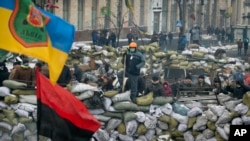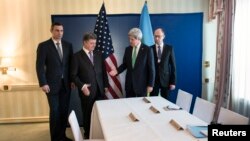MUNICH —
Western powers and Russia exchanged sharp words over the future of Ukraine at the Munich Security Conference in Germany on Saturday.
Addressing the conference, U.S. Secretary of State John Kerry said nowhere was the "fight for a democratic, European future" more important than in Ukraine — which spiraled into chaos after President Viktor Yanukovych backed out of a European Union trade deal in favor of closer ties to Russia last November — and that the U.S. and EU stood "with the people of Ukraine in that fight."
Kerry later met with three of Ukraine's opposition leaders, Arseny Yatsenyuk, Petro Poroshenko and former boxing champion-turned-activist Vitaly Klitschko, who called the protesters' goal a modern, European state.
"Right now they say 'enough, enough to wait, enough corruption, enough of living without rules,' and they are getting slowly aggressive and we need a reaction from the president of Ukraine," said Klitschko, adding that Yanukovych bears "full responsibility for everything that happens in Ukraine."
Yanukovych has said in recent statements that his opponents are escalating the crisis, unlike his own government, which, he says has fulfilled obligations to end the standoff by replacing the prime minister and granting amnesty to arrested protesters.
Russian Foreign Minister Sergei Lavrov echoed that sentiment while addressing the Munich conference, accusing European politicians of fomenting Ukraine's anti-government protests.
"Why don't we condemn those who seize and hold government buildings, attack the police, torch the police, use racist and anti-Semitic and Nazi slogans?" Lavrov said.
On Friday, Yanukovych signed legislation offering amnesty to protesters detained during anti-government demonstrations. But opposition leaders rejected the measure, saying that it only grants amnesty only if other protesters vacate the government buildings they have seized.
The standoff leaves outside powers with little direct influence to help end the crisis, says European Council of Foreign Relations analyst Olaf Boehnke.
"You have to put pressure on the government in certain ways, but by the end of the day it is pretty much an issue of the Ukrainian people and the demonstrators," Boehnke said in an interview over Skype, adding that the international community should keep up its criticism of human rights abuses by Yanukovych forces.
Tensions in Ukraine rose Thursday after opposition activist Dmytro Bulatov, missing since January 22, was found outside Kyiv with severe cuts and bruises to his face, along with other injuries. Bulatov said he was kidnapped by unknown abductors, tortured and held for days before being abandoned in a forest. Bulatov says he made his way to a nearby village, where he reached his friends by phone.
The U.N. human rights office has called on President Yanukovych to investigate recent reports of deaths, kidnappings and torture during the nation's political unrest. A spokesman for U.N. High Commissioner for Human Rights Navi Pillay said the commissioner is "appalled" by the reports.
Yanukovych issued a statement Thursday accusing opposition leaders of escalating the political crisis and saying the government has fulfilled its obligations to end the standoff.
Russian President Vladimir Putin said Wednesday he wants to wait for a new government in Ukraine before proceeding with a promised $15 billion loan to Ukraine along with substantial natural gas discounts.
Some information for this report comes from AP, AFP and Reuters.
Addressing the conference, U.S. Secretary of State John Kerry said nowhere was the "fight for a democratic, European future" more important than in Ukraine — which spiraled into chaos after President Viktor Yanukovych backed out of a European Union trade deal in favor of closer ties to Russia last November — and that the U.S. and EU stood "with the people of Ukraine in that fight."
Kerry later met with three of Ukraine's opposition leaders, Arseny Yatsenyuk, Petro Poroshenko and former boxing champion-turned-activist Vitaly Klitschko, who called the protesters' goal a modern, European state.
"Right now they say 'enough, enough to wait, enough corruption, enough of living without rules,' and they are getting slowly aggressive and we need a reaction from the president of Ukraine," said Klitschko, adding that Yanukovych bears "full responsibility for everything that happens in Ukraine."
Yanukovych has said in recent statements that his opponents are escalating the crisis, unlike his own government, which, he says has fulfilled obligations to end the standoff by replacing the prime minister and granting amnesty to arrested protesters.
Russian Foreign Minister Sergei Lavrov echoed that sentiment while addressing the Munich conference, accusing European politicians of fomenting Ukraine's anti-government protests.
"Why don't we condemn those who seize and hold government buildings, attack the police, torch the police, use racist and anti-Semitic and Nazi slogans?" Lavrov said.
On Friday, Yanukovych signed legislation offering amnesty to protesters detained during anti-government demonstrations. But opposition leaders rejected the measure, saying that it only grants amnesty only if other protesters vacate the government buildings they have seized.
The standoff leaves outside powers with little direct influence to help end the crisis, says European Council of Foreign Relations analyst Olaf Boehnke.
"You have to put pressure on the government in certain ways, but by the end of the day it is pretty much an issue of the Ukrainian people and the demonstrators," Boehnke said in an interview over Skype, adding that the international community should keep up its criticism of human rights abuses by Yanukovych forces.
Tensions in Ukraine rose Thursday after opposition activist Dmytro Bulatov, missing since January 22, was found outside Kyiv with severe cuts and bruises to his face, along with other injuries. Bulatov said he was kidnapped by unknown abductors, tortured and held for days before being abandoned in a forest. Bulatov says he made his way to a nearby village, where he reached his friends by phone.
The U.N. human rights office has called on President Yanukovych to investigate recent reports of deaths, kidnappings and torture during the nation's political unrest. A spokesman for U.N. High Commissioner for Human Rights Navi Pillay said the commissioner is "appalled" by the reports.
Yanukovych issued a statement Thursday accusing opposition leaders of escalating the political crisis and saying the government has fulfilled its obligations to end the standoff.
Russian President Vladimir Putin said Wednesday he wants to wait for a new government in Ukraine before proceeding with a promised $15 billion loan to Ukraine along with substantial natural gas discounts.
Some information for this report comes from AP, AFP and Reuters.













